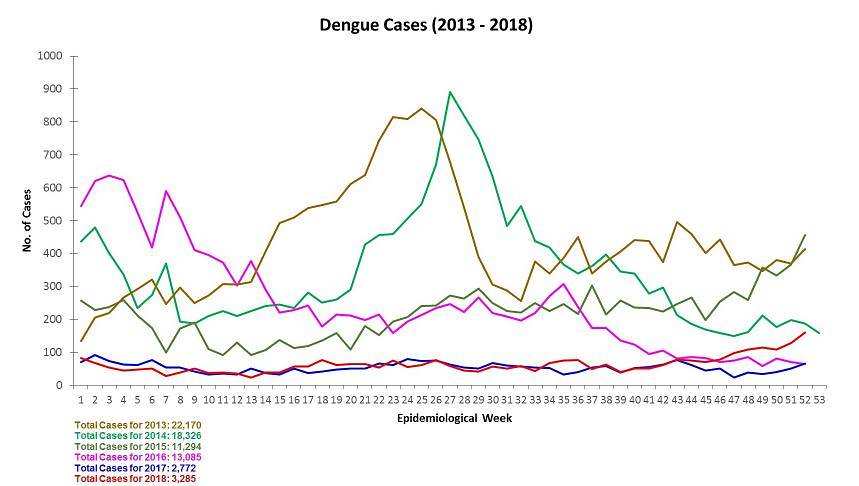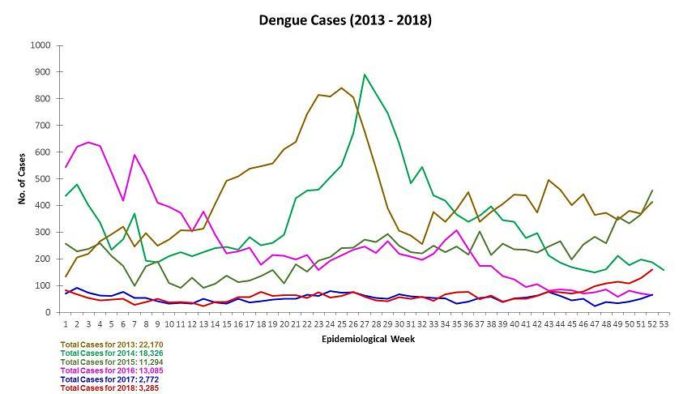SINGAPORE: The Aedes aegypti mosquito population has increased by almost three times since the last major dengue outbreak in 2013, the National Environment Agency (NEA) said on Friday (Jul 19) as it outlined some of the key reasons for the high number of cases this year.
As of Thursday, there were 188 active dengue clusters in Singapore, of which more than 45 are listed as high-risk. There have also been 7,808 dengue cases so far this year, about five times more than the same period last year.
The largest dengue cluster in Woodlands, where there were 216 reported cases, has closed and is now under surveillance, NEA said.
Five people have died from dengue this year.
“We are in the peak dengue season in Singapore, which usually stretches from June to October, and the region around us is similarly seeing an upsurge of dengue cases this year,” the agency said in a media advisory.
“Urgent community action is needed to eliminate all potential mosquito breeding habitats.”
KEY REASONS FOR SURGE
Based on NEA’s surveillance, the surge in cases can be attributed to three factors – an increase in the mosquito population, warmer weather and a low herd immunity.
The Aedes aegypti mosquito population is “persistently high”, the agency said, adding that the population has increased by almost three times since the last outbreak in 2013.
READ: More mosquitoes or mutating virus? Experts have different views on dengue spike
In addition, the mean temperature for the first half of this year was 0.7 degrees higher than during the same period last year.

Number of dengue cases from 2013 to 2018. (Graph: NEA)
“Warmer temperatures result in higher transmission of dengue due to the accelerated development of the Aedes mosquito and shorter incubation period of the dengue virus,” the media advisory read.
“At the same time, a large proportion of our population continues to be susceptible to dengue, given our population’s low herd immunity.”
The proportion of adults who have had dengue before has reduced from 59 per cent in 2004 to 41 per cent in 2017.
MOSQUITO BREEDING MOSTLY IN HOMES
More than 442,000 inspections have been carried out by NEA between January and June 2019 and about 8,200 mosquito breeding habitats were uncovered.
As of June 2019, about 1,200 enforcement actions had been taken against households for breeding mosquitos.
“To safeguard public health, NEA will not hesitate to take enforcement action against anyone found to have created conditions favourable for the propagation or harbouring of vectors,” the agency added.
The largest dengue cluster in Woodlands, which includes Avenue 6, Woodlands Circle, Woodlands Crescent, Drive 40, Drive 60, Drive 70 and Drive 72, has closed.
NEA said there has been a slowing down in dengue transmission in the past seven weeks there and no reported cases over the past two weeks.
The rate of dengue transmission has also slowed at the Chai Chee cluster, where there have been 130 cases.
But the agency warned against complacency and said people must maintain vigilant.
READ: The Big Read: As temperatures and urbanisation increase, fight against dengue will only get tougher
There are currently 188 active clusters, with large clusters in Geylang Road and Jalan Lembah Thomson.
“While these have come down compared to the past weeks, the transmission in these two areas remains persistent, although at a lower case level,” NEA said.
A faster rate of dengue transmission has also been observed at Aljunied Road, Pasir Ris Drive 3, Changi Road and Jurong East Ave 1.
About 60 per cent of the mosquito breeding habitats found in Singapore are found in homes. In the largest Woodland cluster which just closed, 87 per cent of the mosquito habitats were in homes.
“The majority of mosquito breeding habitats found in most of these clusters are within residential premises,” NEA said.
“All residents living in cluster areas are strongly encouraged to cooperate with NEA officers, and facilitate their checks and indoor misting in their homes.
“As the Aedes aegypti mosquito has adapted well to the urban environment, it is critical to eradicate mosquito breeding habitats and adult mosquitoes. Adult Aedes mosquitoes tend to rest inside homes.”
NEA warned residents living in cluster areas to apply mosquito repellent regularly and to keep their homes free of stagnant water.
“All stakeholders need to reduce the mosquito population urgently. NEA, together with other Government agencies from the Inter-Agency Dengue Task Force, as well as all Town Councils, are continuing to check public areas and housing estates for potential mosquito breeding habitats, with officers carrying out daily checks,” the agency said.
“We are also eliminating adult mosquitoes through measures such as space-spraying and the deployment of Gravitraps.”





